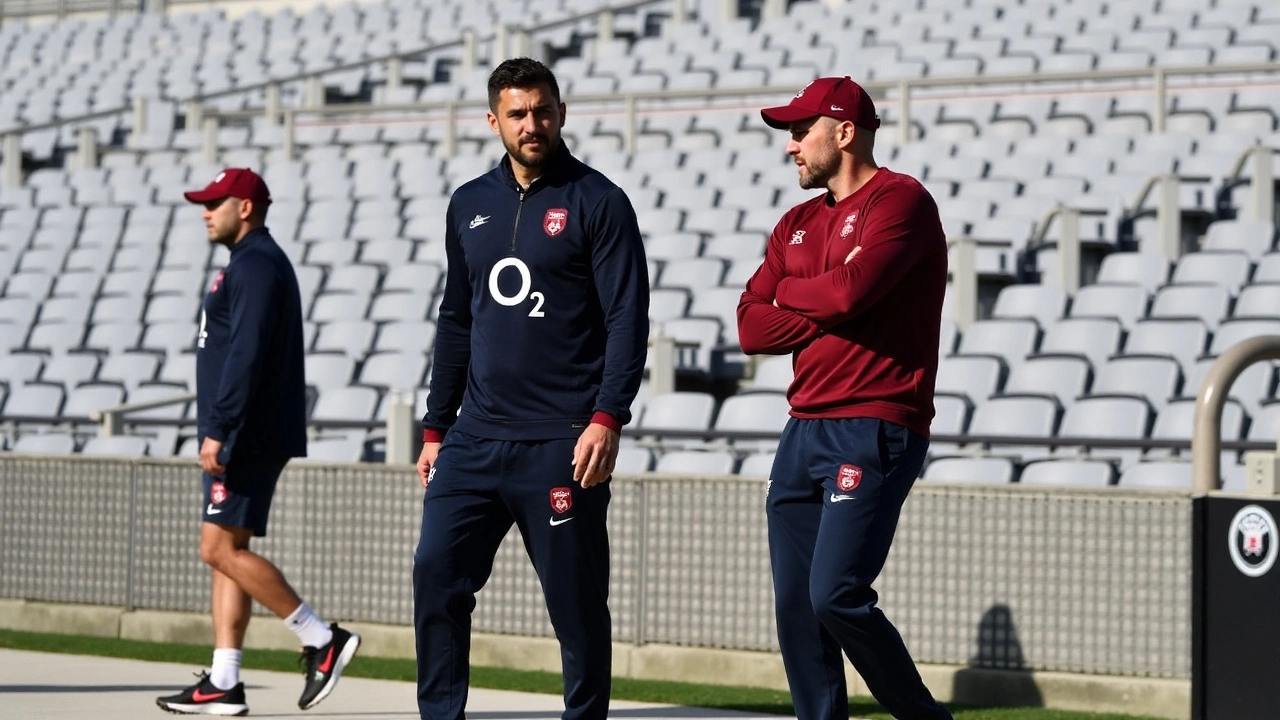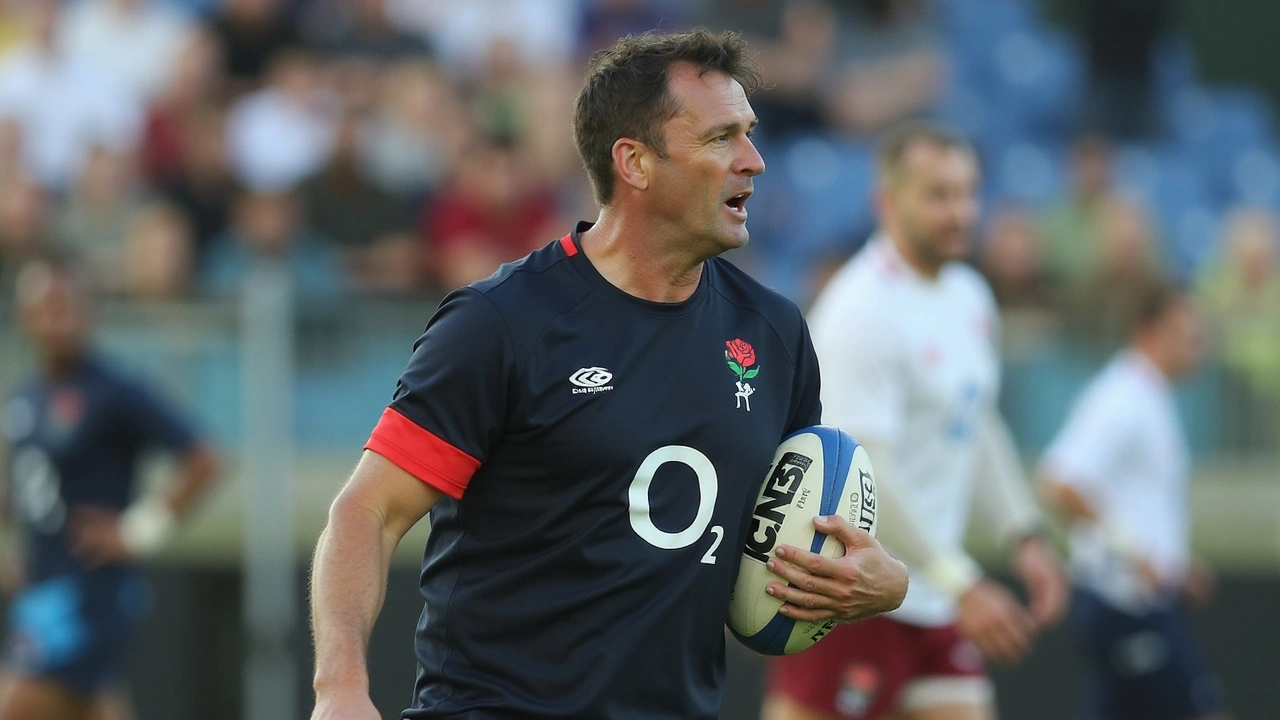25 Aug 2024
- 15 Comments
Felix Jones Steps Down As England’s Defence Coach
Felix Jones has stepped down as England's defence coach, marking yet another turbulent chapter in Steve Borthwick's tenure as head coach. A vital cog in the coaching machinery, Jones brought with him a wealth of experience from South Africa and had only been part of the England setup for the past 10 months. His arrival was seen as a strategic move to bolster England’s defensive tactics, an area that had shown vulnerabilities in recent competitions.
Jones’s influence was immediately felt. Through his guidance, England adopted an aggressive blitz defence that, albeit with initial teething problems, began to show promise. During the Six Nations, Jones’s strategies helped transform the defensive line, and this newly adopted rigor was evident in the narrow defeats against New Zealand in their July fixtures in Dunedin and Auckland. Despite the losses, pundits praised the solidified defensive stance as a significant improvement.
Departures Raise Questions Over Stability
Jones’s resignation follows the earlier exits of head of strength and conditioning Aled Walters and long-serving conditioning coach Tom Tombleson. Walters, who has since moved to Ireland’s setup, had worked closely with Jones during their tenure with Munster and South Africa under the guidance of Rassie Erasmus. This bond undoubtedly played a role in Jones’s decision to part ways with the England team.
The sudden departures have sparked concerns over the stability within Borthwick's management approach. This scenario echoes the instability witnessed during Eddie Jones' era, where frequent staff changes seemed to destabilize the team rather than fortify it. Jones's contract includes a 12-month notice period so he could theoretically remain with the team until next summer if the Rugby Football Union (RFU) decides to enforce this clause. However, keeping a coach who has already opted to resign might not be the best strategy for team morale.
Implications on Current and Future Coaching Dynamics
The reshuffle has left other coaching staff members in uncertain positions as well. Kevin Sinfield, a celebrated rugby league figure, who was relegated to the role of skills coach following Jones's integration, now faces ambiguity regarding his future with the team. Fans and analysts alike are speculating if Sinfield will see a return to a more prominent role following Jones's departure.
The current composition of the coaching team sees Richard Wigglesworth as attack coach, Tom Harrison handling the scrum duties, and Andrew Strawbridge offering his expertise as a coaching consultant. While these roles appear solidified for now, the air of uncertainty cannot be ignored, especially with the upcoming autumn schedule featuring high-pressure matches against heavyweights like the All Blacks, Australia, South Africa, and Japan.

Pressure Mounts Ahead of Crucial Autumn Fixtures
The forthcoming matches present both an opportunity and a challenge for Borthwick and his evolving coaching cadre. Rallying the team amidst these abrupt coaching changes could either galvanize the players towards a stronger, united front or expose cracks that opponents may exploit. The stakes are high, and the spotlight will be on how effectively this team can adapt and perform under Borthwick's direction.
Borthwick, however, remains optimistic. Insiders suggest that he views these changes as a chance to innovate and rebuild a more cohesive coaching unit. This optimism, though, will be tested on the field soon enough. The resilience and adaptability of England’s rugby team will be on full display. Fans and critics alike will be watching closely as the team navigates this period of transition amidst the looming autumn fixtures.


Emanuel Hantig
August 25, 2024It's tough seeing another coach walk away, especially after the groundwork he laid in those ten months. The players have to internalize the defensive mindset he tried to instill, and that takes time and collective belief. I think the key is to keep the spirit of that aggressive blitz alive, even if the staff changes, because continuity feeds confidence 😊.
Byron Marcos Gonzalez
August 25, 2024Oh the ever‑ever shifting sands of England rugby's coaching carousel, a tragic opera of ambition and betrayal where the only constant is chaos 🌀.
Chris Snyder
August 25, 2024The defensive patterns Jones introduced focused on a high line press and quick ruck clear‑outs, which, when executed well, can force turnovers deep in the opponent's half. In the Six Nations we saw moments where that aggression paid off, but the execution lagged due to lack of cohesion. With his exit, the current staff will need to reinforce those fundamentals during training camps.
Hugh Fitzpatrick
August 25, 2024Sure, because a few extra ruck clear‑outs will magically fix a system that has been half‑baked for months – nothing says 'ready for the All Blacks' like a half‑cooked defensive recipe.
george hernandez
August 26, 2024The departure of Felix Jones is more than a headline, it is a signal of deeper turbulence within the English setup.
The when a coach who arrived with such lofty promises decides to leave, it forces everyone to ask what really lies beneath the surface.
The defensive philosophy he tried to embed was a daring blend of aggression and structural discipline, a mix that requires time to mature.
Players who have been asked to shift their habits in a short span often end up confused, especially when the coaching voices keep changing.
Such instability can erode the trust that is essential for a unit that must operate as a single organism on the field.
The timing of this exit, just before the crucial autumn series, adds another layer of pressure that the squad must absorb.
Steve Borthwick now faces the unenviable task of stitching together a defensive framework without the architect who designed it.
He can either rally the remaining staff around a clear, simplified game plan or drown in a sea of tactical indecision.
The upcoming matches against the southern hemisphere heavyweights will serve as a litmus test for the team's resilience.
If the back‑row and the midfield can communicate and cover each other's lapses, the loss of a coach might be mitigated.
Conversely, any lingering doubts about defensive responsibilities could be seized upon by the opposition.
Fans will be watching not only the scores but also the body language of the players as they adjust.
Leadership from the senior group, especially seasoned internationals, will be crucial in bridging the gap left by the staff shuffle.
Historically, England has bounced back from similar upheavals, but those recoveries required a unifying figure on the sidelines.
Whether that figure emerges from the existing bench or from an unexpected appointment remains to be seen.
In any case, the next few weeks will define whether the team can transform chaos into cohesion.
bob wang
August 26, 2024Indeed, the sequence of events, as delineated in the preceding exposition, presents a remarkable tableau of organizational fluidity, which, if adeptly managed, could culminate in a renaissance of English defensive fortitude 😊😊, however, such outcomes are contingent upon decisive leadership, coherent strategic articulation, and unwavering player commitment, all of which must be orchestrated with meticulous precision.
Seyi Aina
August 26, 2024Honestly, this whole coaching merry‑go‑round feels like a bad reality TV show, nobody knows what's really going on and everyone’s just chewing the scenery.
Alyson Gray
August 26, 2024Oh my god the drama is real i cant even 😱 the walls are shaking with all these resignations i feel like the team is stuck in a neverending soap opera its like every week theres a new shocker and i just wanna grab a popcorn and watch the fallout.
Shaun Collins
August 26, 2024Another coach bites the dust.
Chris Ward
August 26, 2024Well, maybe it's a blessing in disguise, fresh ideas could spark a turnaround.
Heather Stoelting
August 26, 2024Come on lads we got this we can turn the chaos into fire and show them what England is made of
Travis Cossairt
August 26, 2024i think the team will just adapt its ok not a big deal
Amanda Friar
August 26, 2024Sure, because adapting on the fly with half a coaching staff is exactly how world champions are built 🙄
Sivaprasad Rajana
August 26, 2024In simple terms, consistency in coaching gives players a clear path, without it they wander and lose focus.
Andrew Wilchak
August 26, 2024Yo, just say the obvious and we’ll be fine.